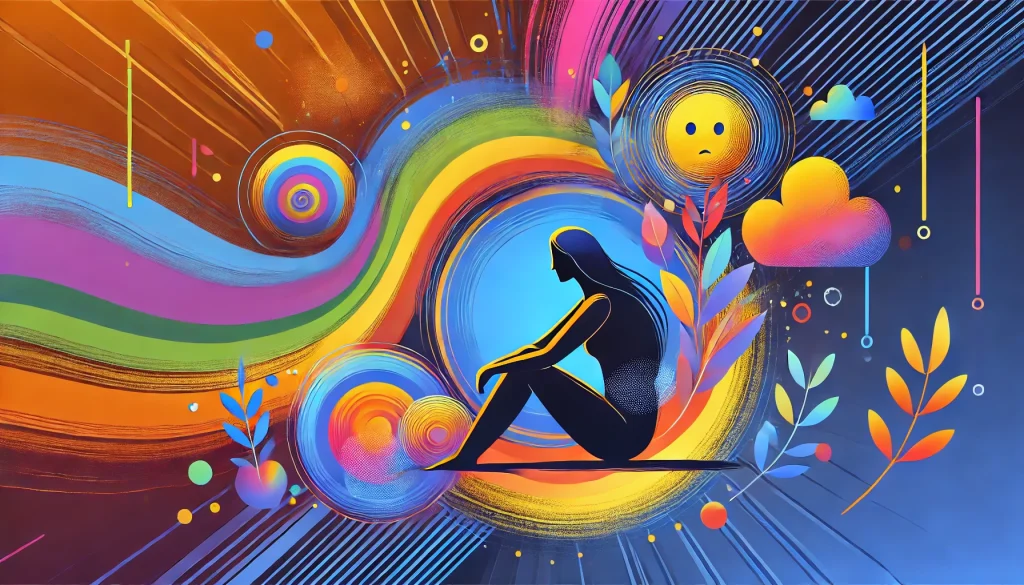
Depression is a term we hear often, but what does it really mean? For many, depression can be an overwhelming and confusing experience, and understanding it can be the first step towards addressing it.
Depression isn’t just feeling sad or down for a few days. It’s a persistent feeling of emptiness, hopelessness, or despair that doesn’t seem to go away. Imagine waking up every day feeling as though a heavy blanket is weighing you down, making even the simplest tasks feel impossible. This isn’t about a lack of willpower or strength; it’s about a complex interplay of biological, psychological, and environmental factors that can affect anyone.
One way to understand depression is by considering its impact on our thoughts, emotions, and behaviours. When we’re depressed, our minds often get stuck in a loop of negative thinking. We might believe we’re worthless, that things will never get better, or that we don’t deserve happiness. These thoughts can feel incredibly real and convincing, even if they’re not true. It’s like wearing dark glasses that distort everything we see, making the world appear bleak and unforgiving.
Emotionally, depression can numb us. We might struggle to feel joy or pleasure, even in activities we once loved. This loss of interest is called anhedonia, and it can make life seem colourless and empty. Imagine having your favourite food in front of you but being unable to taste it. That’s what depression can do to our ability to experience positive emotions.
Our bodies also respond to depression. We might feel constantly tired, have trouble sleeping, or sleep too much. Some people experience changes in appetite, either losing it or overeating. These physical symptoms can start a harmful cycle, where feeling sick makes it even harder to cope with emotional stress. Depression also affects our behaviour. We might withdraw from social activities, even from people we care about. It can be hard to explain why we don’t want to see friends or family, and this isolation can make us feel even more alone. It’s like being stuck in a room with no windows, feeling cut off from the outside world.
Let’s consider an example of Ethan. Ethan used to be outgoing, enjoyed going out with friends, and loved painting. Over time, Ethan started feeling overwhelmed by life’s challenges. The joy from painting faded, and meeting friends became exhausting. Ethan began to think, “I’m not good enough,” and “What’s the point?” These thoughts became a constant background noise, making it hard to focus on anything else. Ethan started sleeping a lot, hoping to escape these feelings, but waking up only made things worse. The more Ethan withdrew, the more isolated and hopeless they felt.
It’s important to remember that Ethan’s experience is just one example of how depression can manifest. It looks different for everyone. Some people may feel irritable or anxious, while others may struggle with feelings of guilt or worthlessness. Depression doesn’t discriminate; it can affect anyone, regardless of age, gender, or background.
Understanding depression also means recognising that it’s not just a temporary phase or something we can “snap out of.” It’s a real and serious condition that requires attention and care. It’s okay to acknowledge that depression is challenging and complex. It’s not a sign of weakness; it’s a sign of being human.
As we explore this journey together, it’s essential to approach the topic with empathy and compassion. For those who have never experienced depression, it can be hard to understand its depth and impact. But by learning about it, we can become more supportive and reduce the stigma that often surrounds mental health issues.
Depression is a part of many people’s lives, and understanding it can help us offer kindness and support to those who are struggling. It’s about being there, listening, and offering a shoulder to lean on. While we can’t always solve the problem, we can be a source of comfort and reassurance. In this journey through the shadows, knowledge is a light that can guide us. By understanding depression, we can take the first steps toward supporting ourselves and others in finding the way back to the light.
If you or someone you love is struggling with depression, you don’t have to go through it alone. At My Practice Counselling Melbourne, Jonathan Riley and our team are here to help. Reach out today to start your journey toward a healthier, happier life. Contact us now to book an appointment.